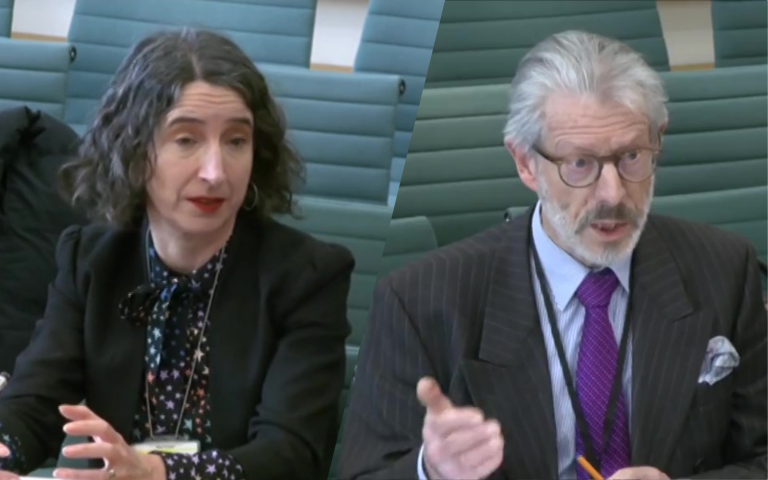Meg Russell and Robert Hazell give oral evidence on the House of Commons standards landscape
25 January 2024
The Constitution Unit’s Director, Meg Russell, and founder, Robert Hazell, gave oral evidence to the Standards Committee on the House of Commons standards landscape.

The Director of the Constitution Unit, Professor Meg Russell, and its founder and former Director, Professor Robert Hazell, gave oral evidence to the House of Commons Standards Committee on 24 January. They appeared alongside Dr Hannah White, Director of the Institute for Government, and Daniel Bruce, Chief Executive of Transparency International UK.
The Standards Committee is currently examining the entire landscape of bodies and processes that have some role in regulating the conduct of MPs.
Professor Russell started by summarising findings from our Democracy in the UK after Brexit project, which found "a huge public interest in integrity" and "a belief amongst the public that this is not policed adequately":
- Our 2021 survey found that the characteristic which respondents most valued in politicians was honesty.
- Both our 2021 and 2022 surveys found that just 6% of respondents agreed that a healthy democracy means politicians sometimes breaking the rules to get things done, against 74% and 78% of respondents, respectively, who believed that a healthy democracy requires that politicians always act within the rules.
- In our 2022 survey, 79% of respondents said that reform was needed so that politicians who do not act with integrity are punished, while only 6% said that the system should stay as it is.
- In our 2022 survey, respondents ranked 'politicians speaking more honestly' as the reform which would most improve UK democracy, and only slightly behind that favoured 'MPs being thrown out of parliament for lying'.
Professor Hazell responded to a question on whether MPs should swear to uphold the ‘Nolan principles’ (otherwise known as the Seven Principles of Public Life) as part of their introduction oath. He recommended that, instead of amending the Promissory Oaths Act 1868, the House of Commons should look towards the practice in the House of Lords, where, after taking the oath, members are required to sign a written declaration to abide by the House of Lords Code of Conduct.
The House of Commons Code of Conduct includes the Nolan principles, but it was for the Committee to judge whether to swear or to sign a written declaration to abide by the code was the "more solemn undertaking".
Professor Russell said that publicly undertaking to uphold the ‘Nolan principles’ would bring the principles "to the front of the minds of members when they join" and that the practice would both set a standard that would then need to be kept, and would be symbolically important, attracting public attention following a period of low confidence in the standards of MPs.
Responding on the differing systems of standards which apply to ministers and MPs, Professor Hazell said that it would be "seriously difficult" to merge the Ministerial Code with the House of Commons Code of Conduct. However, it would be "worth exploring" merging the government’s List of Ministers’ Interests with the Commons’ Register of Members’ Financial Interests. The Parliamentary Commissioner for Standards and Independent Adviser on Ministerial Interests could invited to discuss the feasibility of combining or aligning the two registers.
Later, witnesses were asked whether there should be a single portal to allow members of the public to access the standards system. Professor Hazell said that his research into constitutional watchdogs regulating the executive has found a "fragmented picture" in respect of the websites of these watchdogs, with very varied levels of quality and accessibility. There should be a single portal explaining the role and functions of each of the watchdogs, managed by the Committee on Standards in Public Life or the Cabinet Office.
Turning specifically to the parliament website, Professor Russell highlighted that one webpage about standards, which appeared to rank highly in Google, was blank, while another contained more information, but did not explain clearly what the different standards bodies do. The public should be able to access page listing all the relevant standards bodies, explaining their roles, and indicating how to make a complaint.
A full recording of Professors Russell and Hazell’s appearance can be found below.
Useful links:
- Meg Russell and Robert Hazell’s oral evidence (HTML) / (PDF)
- Robert Hazell’s written evidence (HTML) / (PDF)
- Constitution Unit research into public attitudes towards democracy
- Constitution Unit research into parliament’s watchdogs
- The Standards Committee’s inquiry into the House of Commons standards landscape
 Close
Close

